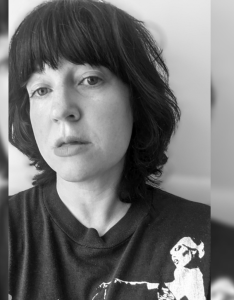In 2018, Bonsound, one of the most important corporate entities on Québec’s music scene, decided to grow in a new direction: music publishing. The organization tasked Marie-Ève Rochon, their experienced booking agent, with developing the new department. And she did: “what I like about the world of publishing is that there’s no two days that are alike,” she says.
Bonsound was already involved in album production and marketing, concert production, and career management. Music publishing – a rapidly growing field, thanks to the many opportunities available to songwriters through synchronization (the use of music in screen productions) – thus completes the range of services offered by the company, which celebrates its 20th anniversary in 2024.
As the licensing and publishing executive for Bonsound, Rochon learned the ropes of the business as she was building her new department. As she started, she “signed up for a training session offered by the Association des professionnels de l’édition musicale [APEM] and I learned a lot from that,” she says, also acknowledging the importance of the person she refers to as her mentor in the business, David Murphy. His experience as a music publisher led him to found his own company specializing in music and screen rights management, and who assists Bonsound with its administration.
 Rochon offers some insight into the thinking of Bonsound’s founders that led to the development of the publishing department. Various factors emerged with the transformation of the music industry, starting with the need to diversify the company’s revenues. “We got a Gold record with one of Lisa LeBlanc albums, but we’ll probably never see that happen again,” she explains. The decline in record sales revenue spurred record labels to rely more heavily on show production, and look into synchronization.
Rochon offers some insight into the thinking of Bonsound’s founders that led to the development of the publishing department. Various factors emerged with the transformation of the music industry, starting with the need to diversify the company’s revenues. “We got a Gold record with one of Lisa LeBlanc albums, but we’ll probably never see that happen again,” she explains. The decline in record sales revenue spurred record labels to rely more heavily on show production, and look into synchronization.
What’s more, “Established publishers already manage huge catalogues of works,” says Rochon. “We felt there was room for us to offer support to Francophone artists, which, in parallel, allows us to get involved in the creative side of songwriting.” Which they did by organizing song camps with musicians from the Bonsound roster.
“There’s nothing redundant in the publishing trade, not even the administration side of it,” says Rochon. “But as far as learning the trade, I took advantage of the structure that was already in place at Bonsound, which is where I learned accounting,” a skill that’s essential to publishing. “I don’t find it boring to make sure everything is properly declared, following up on requests, etc. I was lucky because I started from scratch in publishing, but I had experience and a structure behind me.”
The job of a music publisher, essentially, is to develop and exploit a catalogue of works; at Bonsound, that’s roughly 500 songs by 20 artists. But this approach is measured in terms of dissemination as much as in terms of income, and nowadays, a large part of that happens through placing songs in advertising, and film and television productions. This means the success of a publishing organization depends in part on how close its ties with those sectors are.
“Bonsound has invested a lot of energy in international development over the last two or three years,” says Rochon. “We participate in a lot of networking events and showcases to get in touch with music supervisors” – who are key players in the new music economy, acting as brokers for music used in screen productions.
Rochon says she receives about 30 music requests (briefs) a week from music supervisor with whom she’s in contact, looking for the right song for a new TV series or ad. Most calls originate in L.A., and the rest are from the rest of Canada, and Europe. It’s essential to prepare playlists specific to the needs of music supervisors, and to be pro-active and pitch them new works by artists represented by Éditions Bonsound.
“The important part is establishing and maintaining contacts,” says the publisher. “We’ve created a newsletter for our music supervisors, where we inform them of our new releases. Canvassing is a long-term job, and the risk of boring our music supervisors is very real, because you can imagine those individuals are constantly solicited!”
In five years, Rochon’s work has paid off. “But I still see the department as a start-up,” she says. “We’re brand new in the publishing world, so we’re still in the investment stage. It’s something we’re building slowly, but it’s promising,” she says, mentioning that Bonsound has also built a dedicated website for music supervisors.
Her work is also accomplished through a synergy with the label’s other departments. “When you get a sync project, it’s very useful when that artist’s manager is sitting at the desk next to yours!” says Rochon, who also collaborates with songwriters. “There’s still a lot of education to be done with artists about the role of the publisher,” she acknowledges.
“And also education on being well-equipped. For example, when an artist is recording an album, we’ll recommend that they make sure they have the instrumental versions of the songs, or the stems,” separate tracks of the elements of a song that are easy to share. “That’s very important when you want to get in the world of advertising.”